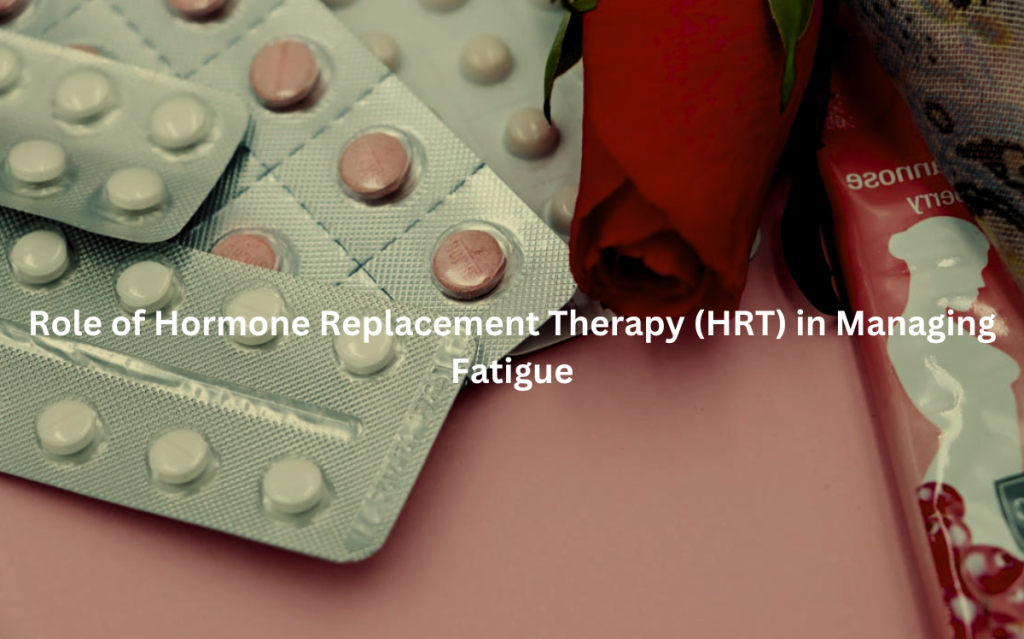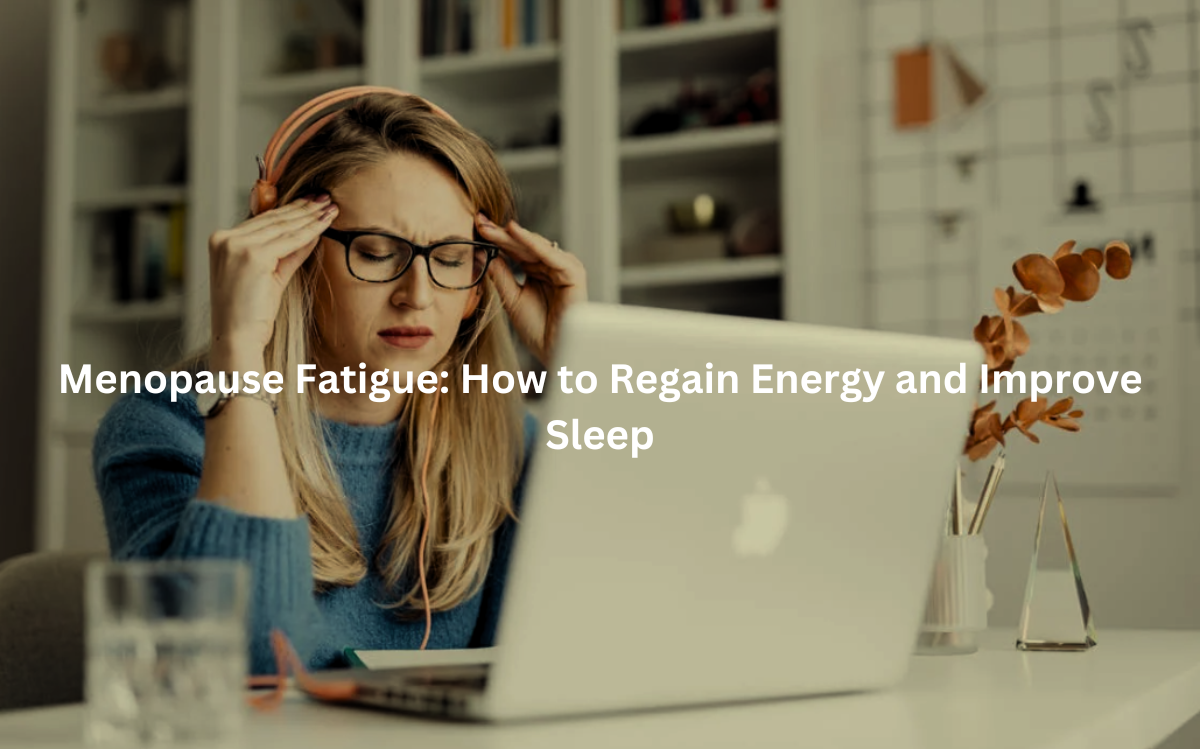Struggling with fatigue during menopause? Learn effective strategies to boost energy and improve sleep quality.
Menopause fatigue can feel overwhelming, with low energy, poor sleep, and brain fog disrupting daily life. Hormonal changes during this time can cause tiredness, night sweats, and even sleep apnea, but there are solutions. (1)
From hormone therapy to lifestyle changes, there are ways to regain control and improve your quality of life. This article will provide practical tips for managing menopause-related fatigue and restoring your energy levels.
Key Takeaways
- Hormonal changes are the primary cause of menopause fatigue, but HRT can help alleviate symptoms.
- Regular exercise, a healthy diet, and stress management techniques are essential for combating fatigue.
- Improving sleep quality by addressing hot flashes and sleep disturbances is key to boosting energy levels.
Understanding Menopause Fatigue
Menopause fatigue is a common, but often misunderstood, issue for women during the menopausal transition. (2)
It isn’t just about feeling tired—it can be an overwhelming sense of exhaustion that impacts everyday activities. Whether it’s trying to get through a busy workday or simply managing household chores, the energy drain feels endless.
Symptoms of menopause fatigue go beyond just tiredness. Women frequently report feeling sluggish, experiencing brain fog, and struggling with a lack of energy.
Sleep disturbances, including waking up frequently at night, are also a key contributor. The body’s natural changes during menopause disrupt its rhythm, leaving many feeling like they’re stuck in a fog, unable to focus or find the energy to get moving.
Causes of Menopause Fatigue
There’s no one cause for fatigue during menopause; rather, it’s a combination of factors. Hormonal changes are at the core. As estrogen levels drop, many women experience a series of physical and emotional changes.
Estrogen has a profound effect on energy levels, and as this hormone decreases, it can result in feelings of fatigue. These changes also affect other systems in the body, amplifying the exhaustion.
Sleep quality is another major culprit. Hot flashes and night sweats disturb sleep, making it harder to rest properly.
For some women, sleep apnea becomes an issue, as hormonal changes affect breathing patterns during sleep. When you’re not getting enough restorative sleep, it compounds the feeling of fatigue during the day.
Stress can make matters worse. Menopause is already a time of upheaval, both physically and emotionally, and high stress levels can add to the overall sense of exhaustion.
For many women, the perceived stress during this period—combined with physical changes—can make them feel like they’re running on empty.
How Menopause Affects Mental Health and Energy Levels
Menopause is not just a physical transition; it deeply affects mental well-being. Mood swings, anxiety, and depression are all too common during this time.
These emotional shifts can have a major impact on energy levels. For some, anxiety might make it hard to relax and recharge, while depression can contribute to feelings of apathy and a lack of motivation.
The effect of menopause on brain function is also notable. Cognitive decline, memory problems, and brain fog are often reported by women.
It’s as if the mind is working in slow motion, and even simple tasks feel overwhelming. These symptoms, combined with the physical tiredness of menopause, create a vicious cycle that’s hard to break.
Role of Hormone Replacement Therapy (HRT) in Managing Fatigue

Hormone Replacement Therapy (HRT) plays a crucial role in managing menopause-related fatigue. By replenishing declining hormone levels, HRT addresses some of the underlying causes of low energy and poor sleep, offering significant relief for many women.
Oestrogen replacement is particularly effective for improving both physical and mental energy levels. As oestrogen levels drop during menopause, women often experience disrupted sleep, decreased vitality, and mood changes. Restoring these hormones can significantly enhance overall well-being and quality of life.
For Canadian women, healthcare providers follow Health Canada’s guidelines to ensure safe and effective HRT use. Common options include:
- Oestrogen-only therapy: Suitable for women who’ve had a hysterectomy, as it does not require additional protection for the uterus.
- Combined oestrogen and progestin therapy: Recommended for women with a uterus to protect against the risk of endometrial hyperplasia caused by unopposed oestrogen.
- Vaginal oestrogen: Delivered through creams, rings, or tablets, this targets localised symptoms such as dryness or urinary discomfort with minimal systemic absorption.
- Transdermal oestrogen: Available in patches, gels, or sprays, this option is often preferred for its lower risk of blood clots and cardiovascular side effects, making it a safer choice for women with higher BMI or cardiovascular risk factors.
Despite its benefits, HRT isn’t suitable for everyone. Potential risks include an increased likelihood of blood clots, stroke, or certain cancers. It’s important to note, however, that oestrogen-only therapy carries minimal breast cancer risk, while vaginal oestrogen is not associated with an increased cancer risk.
Women should work closely with their healthcare providers to evaluate their health history, discuss potential risks, and determine the most appropriate approach. HRT should be reviewed after 3 months and then annually to ensure its continued effectiveness and safety.
For those who cannot or prefer not to use HRT, non-hormonal alternatives, such as SSRIs, SNRIs, and lifestyle changes, can also help manage fatigue and other menopausal symptoms.
HRT can be transformative for managing menopause-related fatigue and improving quality of life. However, personalised care, informed decision-making, and regular monitoring are essential to achieving the best outcomes.
Lifestyle Changes to Combat Menopausal Fatigue
Lifestyle changes are essential for managing menopausal fatigue, complementing the benefits of Hormone Replacement Therapy (HRT). These changes can help improve energy levels, mood, and overall quality of life.
Regular physical activity is one of the most effective ways to combat fatigue:
- Aerobic exercises like walking, swimming, or cycling improve cardiovascular health and boost energy.
- Strength training helps counter muscle loss common during menopause, which is crucial for maintaining metabolism and strength.
Diet plays an equally important role. Women should focus on nutrient-dense foods:
- Fruits, vegetables, lean proteins, and whole grains provide the body with sustained energy.
- Managing weight is key, as excess weight can worsen fatigue and put extra strain on the body.
- Staying hydrated and limiting caffeine and alcohol can also prevent energy dips.
Stress management is another critical component. Techniques proven to help include:
- Mindfulness and deep breathing exercises to lower stress hormones.
- Cognitive Behavioural Therapy (CBT), which has shown effectiveness in managing mood swings and perceived stress.
Quality sleep is essential but can be elusive during menopause. Establishing a consistent bedtime routine, avoiding screen time before bed, and creating a calming sleep environment can make a big difference.
Combining these lifestyle changes creates a holistic approach to combating fatigue, helping women feel more energised and in control during menopause.
The Connection Between Menopause, Weight Gain, and Fatigue
As estrogen levels drop, many women experience weight gain, particularly around the abdomen. This is often coupled with fatigue, and it can feel like a double burden. Weight gain makes it harder to stay active, which in turn can increase fatigue.
Managing weight during menopause is a crucial part of managing overall energy levels. Exercise, combined with a balanced diet, can help control weight and reduce fatigue.
Women might need to adjust their caloric intake as their metabolism slows down during menopause, but the key is to focus on healthy food choices rather than extreme dieting.
The decline in metabolism is linked to hormonal changes, so while it might feel harder to lose weight, it’s not impossible. Regular exercise, particularly strength training to build muscle mass, can help counteract some of these metabolic changes.
Improving Sleep Quality During Menopause
Sleep issues are one of the most frustrating aspects of menopause fatigue. Hot flashes, night sweats, and sleep apnea all contribute to poor sleep quality. But improving sleep hygiene can help. Creating a cool, comfortable sleep environment is essential for getting quality rest.
This might mean using fans, cooling pillows, or wearing lightweight clothing to bed. Reducing caffeine intake in the hours leading up to bedtime can also improve sleep quality.
There are also alternative therapies and treatments to explore. Cognitive Behavioral Therapy for Insomnia (CBT-I) has shown promise for women who struggle with sleep during menopause. For women who are experiencing significant sleep disturbances, it’s essential to consult with a healthcare provider for tailored advice on improving sleep quality.
Seeking Professional Support: Healthcare Providers and Menopause Centers
Seeking professional help is crucial for managing menopause fatigue. Healthcare providers, particularly those specializing in menopause care, can help guide women through this challenging phase. They can offer personalized treatment options, including recommendations for HRT, lifestyle changes, and even mental health support.
In Canada, there are menopause specialists and clinics that provide a wealth of knowledge and resources for women going through menopause.
Consulting with a specialist is especially important for women who are experiencing severe or persistent fatigue, as they can help rule out other underlying health conditions and ensure that symptoms are being managed effectively.
If fatigue is extreme or doesn’t improve with lifestyle changes or HRT, it may be time to explore further medical options. Persistent fatigue could signal other issues, such as sleep disorders, thyroid problems, or even anemia. It’s important not to ignore ongoing fatigue—seeking professional care ensures the best possible outcomes.
Wrapping Up
Menopause fatigue is more than just an inconvenience. It’s a complex, multifaceted issue that affects physical, emotional, and mental well-being. While hormonal changes are a key driver, factors like stress, sleep quality, and lifestyle also play a major role.
For many women, a combination of Hormone Replacement Therapy, lifestyle changes, and proper sleep hygiene can go a long way toward improving energy levels and reducing the effects of fatigue.
By focusing on balanced nutrition, regular exercise, and stress management, women can improve their overall quality of life during menopause.
Professional support from healthcare providers can also offer personalized solutions, ensuring that women have the tools and knowledge they need to manage this significant life transition.
If fatigue is impacting your daily life, book a consultation with Modern Menopause today to get expert advice and support on boosting your energy levels. Book here.
FAQ
1. What causes fatigue during menopause?
Fatigue during menopause is often caused by hormonal changes, particularly the decrease in estrogen levels. These fluctuations can disrupt sleep patterns, increase hot flashes, and cause mood swings, all of which contribute to feeling tired. In addition, lifestyle factors such as stress, poor diet, and lack of exercise can worsen fatigue during this time.
2. How can I manage fatigue during menopause?
Managing fatigue during menopause involves improving sleep hygiene, staying physically active, and managing stress. Regular exercise, especially strength training, can boost energy levels and help with sleep. A balanced diet rich in vitamins and minerals is also key. For some women, hormone replacement therapy (HRT) may help alleviate symptoms, including fatigue.
3. Is fatigue during menopause normal?
Yes, fatigue is a common symptom of menopause. Many women experience tiredness as their bodies adjust to hormonal changes. The intensity can vary from person to person, with some feeling more exhausted than others. It’s important to monitor other symptoms like sleep disturbances or mood changes, as they can contribute to overall fatigue.
4. Can menopause fatigue be a sign of a more serious issue?
While fatigue is generally linked to menopause, it can sometimes indicate other health issues, such as thyroid problems or anemia. If the fatigue is severe or persistent, it’s important to consult with a healthcare provider to rule out other conditions and ensure proper management of menopause-related symptoms.
5. How long does menopause fatigue last?
Menopause fatigue can last anywhere from a few months to several years, as menopause symptoms vary widely between women. For most, fatigue improves once the body has fully adjusted to the hormonal changes. However, some women may continue to experience fatigue long after menopause, depending on lifestyle and overall health.
References
- https://pmc.ncbi.nlm.nih.gov/articles/PMC5866170/
- https://thebms.org.uk/wp-content/uploads/2023/08/17-BMS-TfC-What-is-the-menopause-AUGUST2023-A.pdf

Leave a Reply